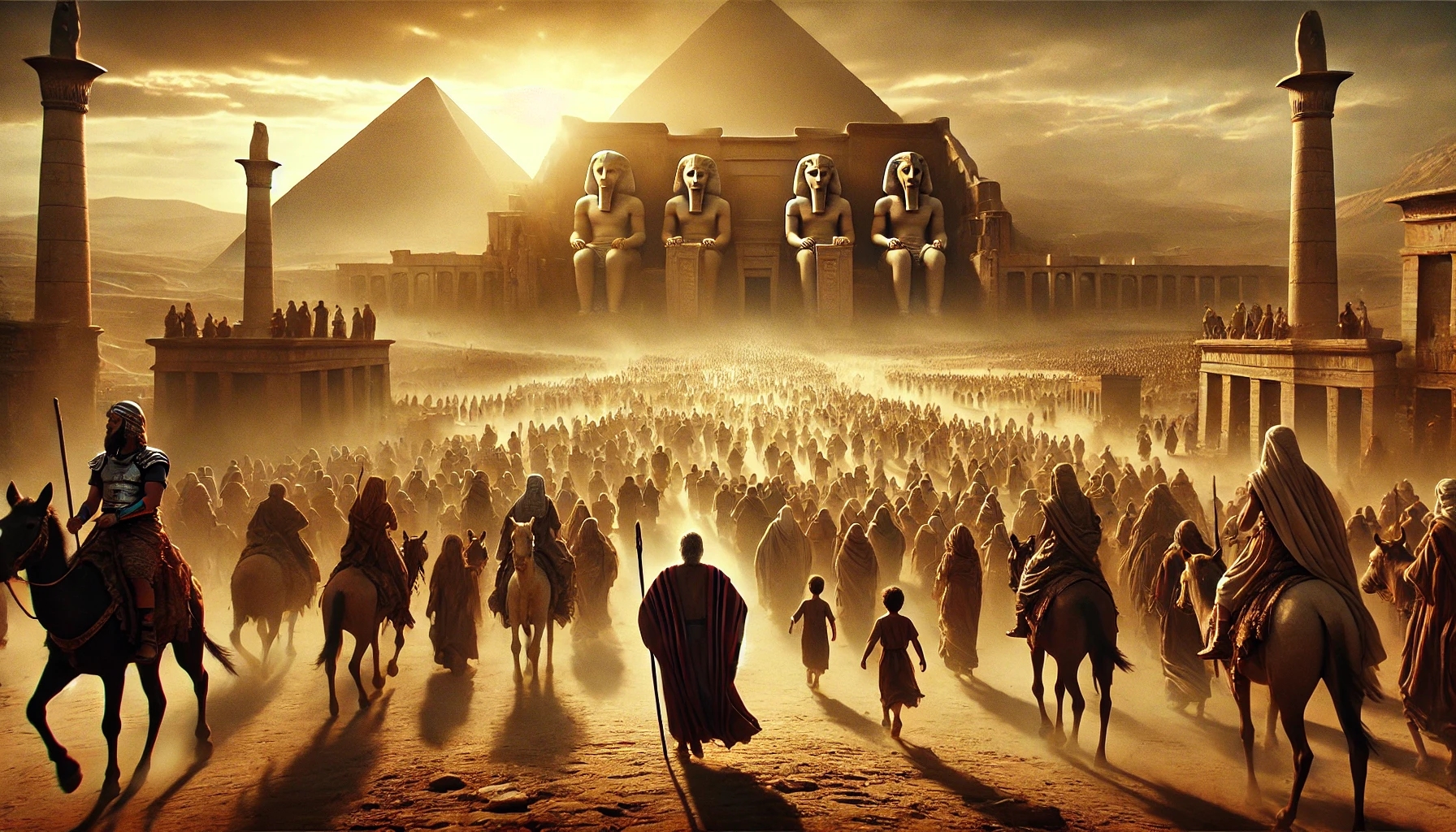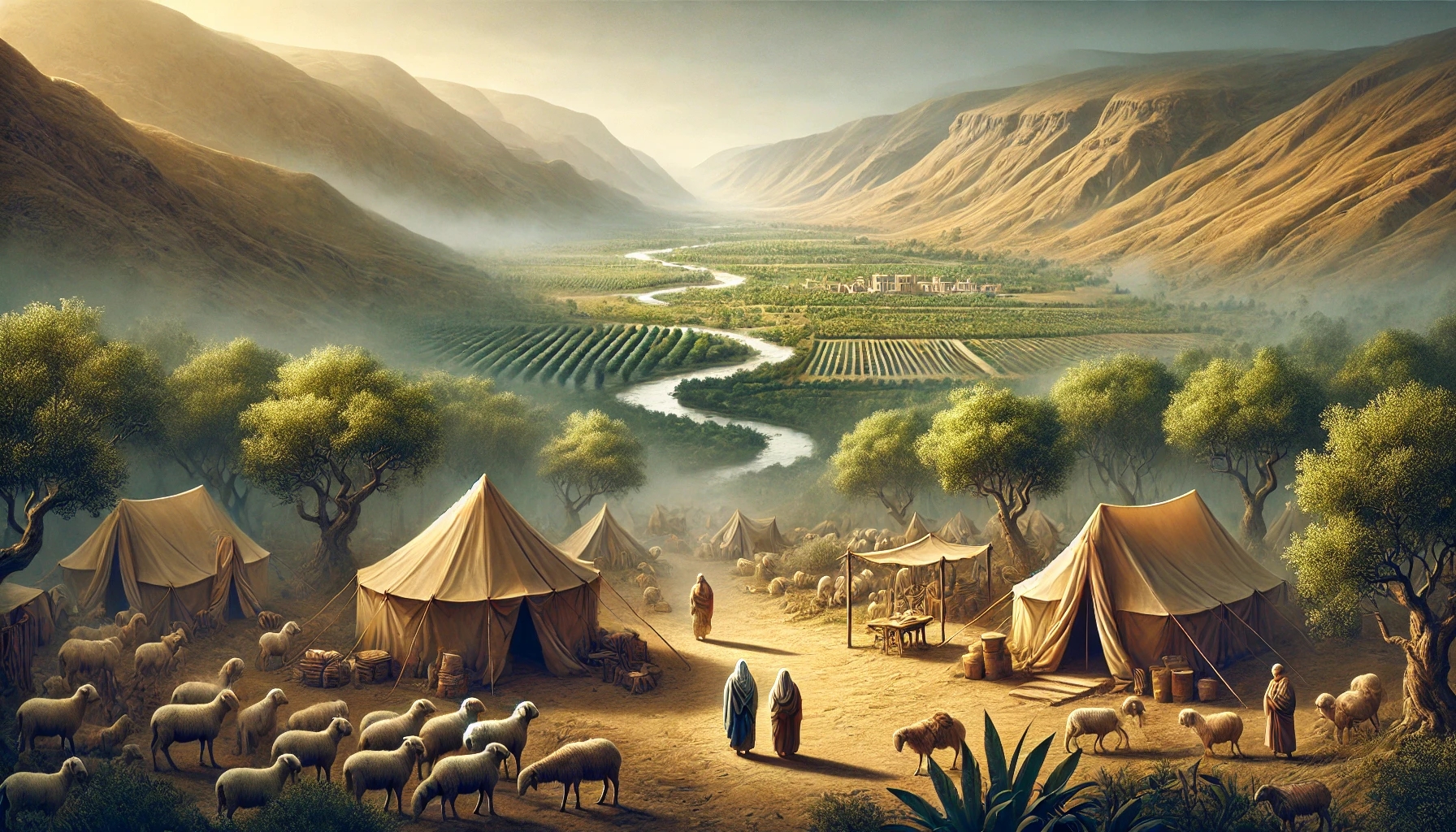
📅 June 18, 2025
📖 DAILY BIBLE READING
✨ Exodus 13 – Remembrance, Obedience, and God’s Guidance
⛺ The Consecration of the Firstborn, the Unleavened Bread, and God’s Presence on the Way to Freedom
══════════════════════════════════════════════
📜 Bible Text – Exodus 13 (KJV)
1 And the Lord spake unto Moses, saying,
2 Sanctify unto me all the firstborn, whatsoever openeth the womb among the children of Israel, both of man and of beast: it is mine.
3 And Moses said unto the people, Remember this day, in which ye came out from Egypt, out of the house of bondage; for by strength of hand the Lord brought you out from this place: there shall no leavened bread be eaten.
4 This day came ye out in the month Abib.
5 And it shall be when the Lord shall bring thee into the land of the Canaanites, and the Hittites, and the Amorites, and the Hivites, and the Jebusites, which he sware unto thy fathers to give thee, a land flowing with milk and honey, that thou shalt keep this service in this month.
6 Seven days thou shalt eat unleavened bread, and in the seventh day shall be a feast to the Lord.
7 Unleavened bread shall be eaten seven days; and there shall no leavened bread be seen with thee, neither shall there be leaven seen with thee in all thy quarters.
8 And thou shalt shew thy son in that day, saying, This is done because of that which the Lord did unto me when I came forth out of Egypt.
9 And it shall be for a sign unto thee upon thine hand, and for a memorial between thine eyes, that the Lord’s law may be in thy mouth: for with a strong hand hath the Lord brought thee out of Egypt.
10 Thou shalt therefore keep this ordinance in his season from year to year.
11 And it shall be when the Lord shall bring thee into the land of the Canaanites, as he sware unto thee and to thy fathers, and shall give it thee,
12 That thou shalt set apart unto the Lord all that openeth the matrix, and every firstling that cometh of a beast which thou hast; the males shall be the Lord’s.
13 And every firstling of an ass thou shalt redeem with a lamb; and if thou wilt not redeem it, then thou shalt break his neck: and all the firstborn of man among thy children shalt thou redeem.
14 And it shall be when thy son asketh thee in time to come, saying, What is this? that thou shalt say unto him, By strength of hand the Lord brought us out from Egypt, from the house of bondage:
15 And it came to pass, when Pharaoh would hardly let us go, that the Lord slew all the firstborn in the land of Egypt, both the firstborn of man, and the firstborn of beast: therefore I sacrifice to the Lord all that openeth the matrix, being males; but all the firstborn of my children I redeem.
16 And it shall be for a token upon thine hand, and for frontlets between thine eyes: for by strength of hand the Lord brought us forth out of Egypt.
17 And it came to pass, when Pharaoh had let the people go, that God led them not through the way of the land of the Philistines, although that was near; for God said, Lest peradventure the people repent when they see war, and they return to Egypt:
18 But God led the people about, through the way of the wilderness of the Red sea: and the children of Israel went up harnessed out of the land of Egypt.
19 And Moses took the bones of Joseph with him: for he had straitly sworn the children of Israel, saying, God will surely visit you; and ye shall carry up my bones away hence with you.
20 And they took their journey from Succoth, and encamped in Etham, in the edge of the wilderness.
21 And the Lord went before them by day in a pillar of a cloud, to lead them the way; and by night in a pillar of fire, to give them light; to go by day and night:
22 He took not away the pillar of the cloud by day, nor the pillar of fire by night, from before the people.
══════════════════════════════════════════════
🔵 Introduction
Exodus 13 directly follows Israel’s departure from Egypt. After God powerfully freed His people, a time of remembrance and reordering begins. God gives Moses instructions to ensure that the memory of this deliverance remains alive: the consecration of the firstborn, the Feast of Unleavened Bread, and the visible signs of God’s nearness in the pillar of cloud and fire. This chapter is rich with meaning for identity, faith, and trust—not only for then, but also for today.
══════════════════════════════════════════════
🟡 Commentary
1. The Consecration of the Firstborn (Verses 1–2, 11–16)
-
Meaning: All firstborns—human and animal—belong to God. This act expresses gratitude and remembrance of the firstborns struck down in Egypt and Israel’s preservation.
-
Symbolism: Consecration reflects God’s claim over Israel—they are His people. Redeeming human firstborns highlights the value of life and God’s grace.
-
Practical aspect: It’s not just religious—it’s educational. Children will ask questions, and this is how the story is passed on.
2. The Feast of Unleavened Bread (Verses 3–10)
-
Remembering the Exodus: Unleavened bread symbolizes haste and purity. The people left Egypt quickly—there was no time for the dough to rise.
-
God’s law in everyday life: The “sign on your hand” and “between your eyes” points to constant mindfulness and obedience. It’s about internalizing God’s Word.
-
A meaningful celebration: This annual festival strengthens identity and reinforces that freedom is God’s gift.
3. God’s Guidance through the Wilderness (Verses 17–22)
-
God’s wisdom: He does not lead the people the shortest way (through Philistine land), to spare them from discouragement and turning back.
-
Joseph’s bones (v. 19): A symbol of hope and the fulfillment of God’s promises. God does not forget.
-
Cloud and fire pillar: Visible signs of God’s presence—cloud by day, fire by night. They symbolize protection, direction, and closeness.
══════════════════════════════════════════════
🟢 Summary
Exodus 13 is a transition chapter—from deliverance to journey. God commands clear practices to remember His mighty act of salvation: the consecration of the firstborn and the Feast of Unleavened Bread. These are to be observed annually and explained to future generations. At the same time, Israel begins its journey toward freedom—on a secure, not direct, path—accompanied by God’s visible presence in a pillar of cloud and fire.
══════════════════════════════════════════════
🔴 Message for Us Today
God doesn’t want us to forget His works. Spiritual remembrance is essential. Rituals, celebrations, and conscious teaching help keep God’s activity alive in our daily lives. Even today, God leads us—sometimes on detours—but always wisely. His presence never leaves us, even when we travel through deserts.
══════════════════════════════════════════════
💡 Reflection Questions
What is your “unleavened bread” today?
What small or large rituals help you remember God’s guidance and faithfulness in daily life? And where might you, like Moses, start carrying the “bones of Joseph”—the hope in God’s promises—even when the path ahead is uncertain?
~~~~~⛺~~~~~

📆 June 15 – 21, 2025
📆 WEEKLY SPIRIT OF PROPHECY READING
📖 Ellen G. White │ Patriarchs and Prophets – Chapter 12
✨ Abraham in Canaan
📖 Read online here
══════════════════════════════════════════════
🔵 Introduction
After his return from Egypt, Abraham settles once again in Canaan. Wealthy in livestock, silver, and gold, it soon becomes clear: true prosperity requires selfless character and unwavering trust in God’s promises. Abraham demonstrates how faith, kindness, and reverence for God not only shape him, but also influence those around him and his entire legacy.
══════════════════════════════════════════════
🟡 Commentary
1.Return, Separation from Lot, and Humble Selflessness
Genesis 13:2–12: Abraham returns home “very rich” and peacefully shares the land with Lot. Although God promised him the entire region, he lets Lot choose first (cf. Gen 13:8–9). Lot chooses the fertile Jordan Valley, ignoring spiritual dangers. Abraham humbly withdraws to Hebron and builds an altar in Mamre.
2.Patriarch as a Bearer of Light: A Testimony in Canaan
- Genesis 13:13–17: Through his simple shepherd life in the highlands, Abraham exemplifies faith: hospitality, God-fearing conversation, trust in God’s protection. His character exerts a quiet yet powerful influence on the pagan rulers.
3.War to Rescue His Nephew: Justice and Nobility
- Genesis 14:1–16: After Lot is taken captive, Abraham leads 318 loyal men against the mighty Elamites. He rescues Lot and his family, without greedily taking from the spoils (Gen 14:22–23). His actions prove that faith is not cowardice, and that justly won freedom should not be used for personal gain.
4.Covenant with God: Star-Faith and Sacrificial Ceremony
- Genesis 15:1–21: Despite struggling with doubts about having an heir, Abraham shows deep faith: he looks at the stars and believes God’s word that his descendants will be as numerous (15:5–6). In the covenant ceremony, he walks between the sacrificed animals in a sign of unconditional obedience, while God Himself appears as a blazing flame (15:17–18).
5.Covenant of Circumcision and Name Change
- Genesis 17:1–27: God renews and confirms the covenant, giving Abraham and Sarah new names (“Father of many nations”, “Princess”) and institutes circumcision as an eternal sign of faith (Romans 4:11).
6.Hospitality and Intercession: From Tent to Prayer
- Genesis 18:1–33: In the oaks of Mamre, Abraham honors three heavenly visitors with exemplary hospitality (Heb 13:2). He learns of God’s plan for Sodom and intercedes boldly for the righteous (Gen 18:23–33), until God promises to spare the city for the sake of just ten righteous people.
══════════════════════════════════════════════
🟢 Summary
Abraham’s life in Canaan displays the many facets of true faith: generous selflessness (separation from Lot), convincing testimony (as a shepherd), courageous justice (rescuing Lot), steadfast covenant faith (counting stars and circumcision), and passionate intercession (for Sodom). Time and again, he demonstrates that God’s blessing and calling require a life of humility, obedience, and active love.
══════════════════════════════════════════════
🔴 Message for Us Today
Selfless generosity creates peace and opens space for God’s blessing.
Testimony through daily life speaks louder than words.
Steps of faith – even in doubt – lead to new promises.
Family and church thrive on visible signs and consistent obedience.
Intercession and hospitality reflect a heart that mirrors God’s love.
═════════════════════════════════════════════
💬 Reflection Question
- Where can I, like Abraham, selflessly lay down my rights today to bring peace?
- In what “highland” of my daily habits do I shine as a biblical witness?
- What step of “star-counting” faith could I dare to take, even when my circumstances seem uncertain?
- How do I practice genuine hospitality and intercession in daily life, as Abraham did?




















